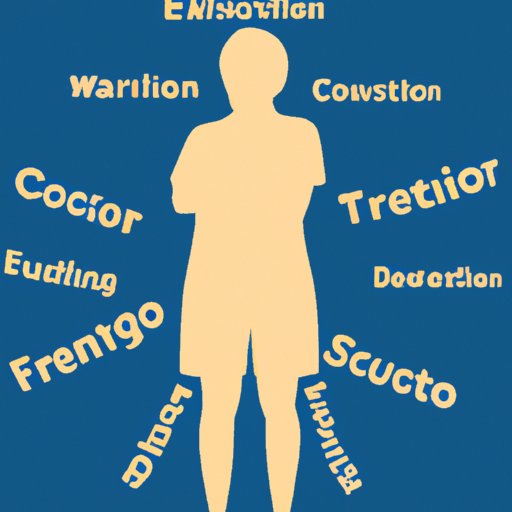Introduction:
Decision-making is an important part of life. It’s how we decide which path to take, who to spend our time with, and how to live our lives. Despite its importance, many people struggle with making decisions. Whether it’s deciding what to wear or which job to take, people often find themselves feeling overwhelmed and anxious when faced with making a decision.
Anxiety plays a major role in difficulty making decisions. When a person feels overwhelmed or stressed, they’re less likely to be able to think clearly and make logical decisions. This can lead to feelings of fear, indecisiveness, and confusion.

Understanding Why You Have Trouble Making Decisions
There are several reasons why a person may have difficulty making decisions. Fear of making the wrong decision is a common cause of indecision. People may worry that if they make the wrong choice, they’ll regret it later or it will have negative consequences. This fear can become so overwhelming that it paralyzes a person from making any decision at all.
Another reason why people may struggle to make decisions is because of an overwhelming amount of options. With so many possibilities, it can be difficult to narrow down the choices and decide on the best one. This can lead to feelings of confusion and frustration, further contributing to difficulty making decisions.
Lack of self-confidence can also be a factor in why someone has trouble making decisions. A person may not feel like they know enough or have the skills necessary to choose the right option. This can lead to feelings of doubt and insecurity, which can prevent them from making a decision.

How to Overcome Fear of Making Decisions
If you’re struggling with fear of making decisions, there are steps you can take to help you move forward. The first step is to identify your fear. Take some time to think about why you’re afraid to make a decision. Is it because you don’t want to make the wrong choice? Or maybe you’re worried about the consequences of your decision? Once you’ve identified your fear, it will be easier to work through it.
The next step is to understand the consequences of your decision. It’s important to consider both the potential positive and negative outcomes of your decision. This will help you to weigh your options and make an informed decision.
Once you’ve considered the consequences, it’s time to reassess your options. Think about what the best choice is for you based on your values and goals. This will help you to make a decision that you feel confident in.
Finally, it’s important to seek out support. Talk to friends or family members who can provide you with perspective and guidance. Having someone to talk to can help you to gain clarity and make a decision that you feel good about.

The Benefits of Learning How to Make Decisions
Learning how to make decisions can bring many benefits. One of the most important is empowerment. Being able to make decisions confidently can give you a sense of control over your life and allow you to make choices that are in line with your values and goals.
Making decisions can also increase your self-confidence. Knowing that you can make decisions and trust yourself to make the right one can help you to feel more secure and comfortable in your own skin.
Finally, learning how to make decisions can improve your overall quality of life. Being able to make decisions quickly and confidently can help you to save time and stress in the long run, allowing you to focus on other aspects of your life.
Strategies to Help You Make Decisions More Easily
Making decisions doesn’t have to be difficult. There are several strategies you can use to make decisions more easily. The first is to break down the decision into smaller steps. Consider each step of the decision-making process and tackle them one at a time. This can help to reduce the overwhelm and make the decision-making process less intimidating.
It’s also important to consider all possible outcomes. Think about how each option could play out and list out the pros and cons of each. This will help you to make a decision that takes into account all the potential risks and rewards.
Trust your gut. Sometimes the best decision is the one that feels right. Don’t ignore your intuition – allow it to guide you in making the right decision for you.
Finally, take some time to think it through. Don’t rush into a decision before you’re ready. Allow yourself the time and space to think things through and make sure you’re making the best decision for you.
Conclusion:
Making decisions can be difficult for many people. Fear of making the wrong decision, an overwhelming amount of options, and lack of self-confidence can all contribute to difficulty making decisions. However, there are steps you can take to help you overcome this challenge, such as identifying your fear, understanding the consequences, reassessing your options, and seeking out support.
Learning how to make decisions can also bring many benefits, including empowerment, increased self-confidence, and improved quality of life. There are also strategies you can use to make decisions more easily, such as breaking down the decision into smaller steps, considering all possible outcomes, trusting your gut, and taking time to think it through.
By exploring why you have trouble making decisions and using strategies to help you make decisions more easily, you can learn to make decisions confidently and reap the benefits of being able to make decisions more easily.
(Note: Is this article not meeting your expectations? Do you have knowledge or insights to share? Unlock new opportunities and expand your reach by joining our authors team. Click Registration to join us and share your expertise with our readers.)
